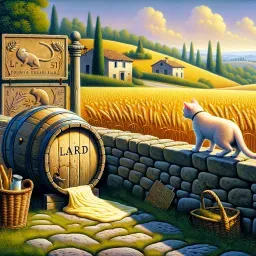Dum spiro, spero

0
0
0
0
- Meaning
- This phrase, "Dum spiro, spero," encapsulates a powerful and universal sentiment that life and hope are intrinsically connected. It conveys that as long as one is alive and breathing, there remains hope for change, improvement, or betterment. The act of breathing symbolizes life, and hope is the driving force that gives life its purpose and resilience. Philosophically, it underscores the human spirit's capacity to remain optimistic even in the face of adversity. Psychologically, it reflects the essence of perseverance and positive thinking, pivotal for mental and emotional well-being. Historically, it resonates with countless individuals and cultures that have relied on hope to endure challenging times.
- Allegory
- The human figure represents the embodiment of resilience and the unyielding human spirit. The stormy landscape signifies life's challenges and adversities. The gentle illumination of the figure's chest symbolizes hope as an internal and sustaining force. The ray of sunlight breaking through the stormy clouds highlights the presence of hope even in the darkest times. The blooming flowers and green shoots growing from the rocky terrain represent growth, renewal, and the continuous presence of hope in adverse conditions. This visual allegory effectively conveys the powerful message encapsulated in "Dum spiro, spero."
- Applicability
- In daily life, this phrase serves as a reminder to hold onto hope regardless of the circumstances. Whether facing personal challenges, professional setbacks, or broader societal issues, "Dum spiro, spero" encourages individuals to keep striving and believing in positive outcomes. It can be applied as a personal mantra to find strength during tough times or as a motivational quote to inspire oneself and others.
- Impact
- The impact of "Dum spiro, spero" on culture and society has been significant and enduring. It has inspired countless individuals to persevere through hardship and remain optimistic. Through its use in literature, personal mottos, and organizational themes, it has fostered a culture of resilience and unwavering hope. The phrase is often cited in contexts of perseverance, motivation, and encouragement, making it a timeless piece of wisdom.
- Historical Context
- The historical context of this phrase stretches back to ancient Rome, where Latin was the lingua franca. The phrase likely emerged from Roman philosophy and literature, both of which emphasized the virtues of fortitude, resilience, and enduring hope. Throughout the Middle Ages and the Renaissance, such maxims continued to play a significant role in education and moral instruction.
- Criticisms
- Criticisms of this phrase might center around the argument that blind hope can lead to unrealistic expectations or prolonged suffering, where acceptance of certain situations might be more psychologically beneficial. Critics could argue that too much emphasis on hope might prevent individuals from making practical decisions or accepting reality as it is.
- Variations
- There are no significant variations of the phrase "Dum spiro, spero," but interpretations might differ slightly across cultures. For example, in Japanese culture, a similar sentiment is captured in the phrase "七転び八起き" (nanakorobi yaoki), which means "Fall seven times, stand up eight." Both phrases convey resilience and the idea of continued effort and hope despite difficulties.
-

Errare humanum est.
-

Divide et impera.
-

Fortis Fortuna iuvat.
-

Amor vincit omnia.
-

Festina lente.
-

De gustibus non est disputandum.
-

Labor omnia vincit.
-

Aut vincere aut mori.
-

Pugna pro patria.
-

The more the cat goes to the lard, the more likely it is to lose a paw.
-

In dubio, abstine.
No Comments